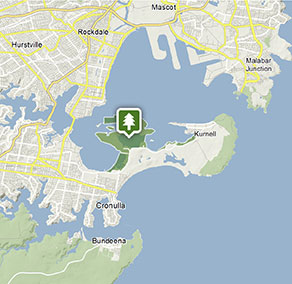School excursion
Ecosystems at risk at Towra Point Nature Reserve
Stage 6 (Years 11-12), Geography, Towra Point Nature Reserve
Overview
Senior students will hone their fieldwork skills in this Stage 6 (Years 11-12) geography excursion at Towra Point Nature Reserve. This Ramsar-listed wetland is the largest and most botanically diverse estuarine wetland remaining in the Sydney region.
Read more about Ecosystems at risk at Towra Point Nature Reserve
The wetland at Towra Point is an ideal location for students to study a vulnerable ecosystem at risk.
Students will learn about the historical uses of this site and the impacts nearby Botany Bay has had on the wetlands over time. We'll discuss why this site holds international significance and protection.
We'll examine the mangrove environment up close, so please be prepared to get muddy and wet.
Students will discuss the current management plans in place to protect this fragile ecosystem, and how these may be strengthened over time.
For program outline, safety and practical information about this excursion, see info for teachers
| Stage | Stage 6 (Years 11-12) |
|---|---|
| Learning area | Geography |
| Student outcomes |
GE-11-01. Examines places, environments and natural and human phenomena, for their characteristics, spatial patterns, interactions and changes over time GE-11-02. Explains geographical processes and influences, at a range of scales, that form and transform places and environments GE-11-03. Explains geographical opportunities and challenges, and varying perspectives and responses GE-11-04. Assesses responses and management strategies, at a range of scales, for sustainability GE-11-06. Identifies geographical methods used in geographical inquiry and their relevance in the contemporary world GE-11-07. Applies geographical inquiry skills and tools, including spatial technologies, fieldwork and ethical practices, to investigate places and environments GE-11-09. Communicates and applies geographical understanding, using geographical knowledge, concepts, terms and tools, in appropriate forms GE-12-01. Analyses rural and urban places, ecosystems, global biodiversity and economic activity, for their characteristics, spatial patterns, interactions, and nature and extent of change over time GE-12-02. Analyses geographical processes and influences, at a range of scales, that form and transform places and environments GE-12-03. Assesses geographical opportunities and challenges, and the role of varying perspectives and responses in their management GE-12-04. Evaluates responses and management strategies, at a range of scales, for sustainability GE-12-06. Justifies geographical methods used in geographical inquiry and their relevance in the contemporary world GE-12-07. Selects and applies geographical inquiry skills and tools, including spatial technologies, fieldwork and ethical practices, to investigate places and environments GE-12-09. Communicates and applies geographical understanding, using geographical knowledge, concepts, terms and tools, in appropriate forms |
| Objectives |
Students will:
|
Excursion details
- When
Weekdays during school term.
- Availability
- Guided. Available on request.
- Duration
- 4-5 hr
- Grading
- Medium. Guided activities along a track and some long grass, through water in a mangrove area and on a beach. No climbing is involved. Insect repellant advised.
- Price
-
$20 per student for groups of 25 or more. GST included. For smaller groups conditions apply.
- Accessibility
- No wheelchair access
- Meeting point
- Meet at Cronulla Wastewater Treatment Plant carpark, Captain Cook Drive, Cronulla
- Equipment
provided - Yes. All equipment is provided.
- Booking
- If you would like to organise a NPWS school excursion please get in touch with local staff or use the 'Enquire' link for the online form.
Operated by
- School excursion inquiries - Sydney South
- 02 9542 0615
- npws.royalguidedtours@environment.nsw.gov.au
- PO Box 144, Audley NSW 2232
Park info
- in Towra Point Nature Reserve in the Sydney and surrounds region
Towra Point Nature Reserve is accessible by boat only. Access to the land is available on special consent for research and educational purposes only. Contact the local Area office on 9668 2000.



